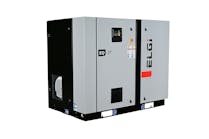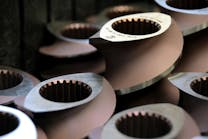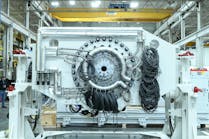Affordable, more versatile instruments now are available from at least three companies that specialize in gauging characteristics such as film thickness, weight, temperature and roughness.
FOCALSPEC
FocalSpec's patented line confocal imaging (LCI) technology can be used in high-speed topographic applications to measure a variety of products, including film. Its new MP9000 device gives users real-time optical surface roughness measurements of polymer films, laminates and coatings using LCI.
Instead of measuring roughness according to one algorithm, the instrument uses two different formulas, widening the base of potential customers who might use it, FocalSpec Sales Manager Juha Saily said.
"The MP9000 web scanner is the next logical step in applying FocalSpec's unique LCI technology after using it in our off-line lab and on-line tube- [and] cable-roughness measurement systems," Saily said. "In addition to roughness, we can also detect and measure other 3-D characteristics, including surface texture, thickness, edge height, wrinkles and folds."
LCI uses different wavelengths of light focused at different distances from the sensor. The sensor takes snapshots of 11.2mm-long segments that each include 2,048 surface points. It can scan 250 profile lines per second, while a monitor continuously displays updates on roughness values.
"We can measure across the whole width of the product," Saily said. With the system software automatically calculating the roughness for each measured section while the production line is running, it's easy to generate quality reports for a user's own internal use or to produce quality certificates for customers.
Saily added that this type of accurate roughness measurement has applications across several industries, particularly for film used in windshields to prevent shattering. The real-time, multiple measurements help the user quickly identify and eliminate roughness issues that could lead to air bubbles.
There are several advantages to being able to measure more than 2,000 surface points in real time, Saily said.• Better quality: Continuous roughness measurement helps ensure that no off-spec product will be sent to customers.• Improved process control: The large amount of data can be used to better understand how different process parameters and materials affect the output, enabling users to refine their processes.• Maximized output: With continuous roughness monitoring, users can identify and correct problems early in the process, enabling them to keep the speeds closer to the maximum for each product and material.• Reduced labor: The MP9000 eliminates the need for manual product sampling.• Faster startups and changeovers: The system provides roughness values at line startups and product changeovers, enabling quicker adjustments of the extrusion line, saving time and reducing scrap.
HAMMER-IMS
Hammer-IMS, which makes noncontact systems for measuring thickness, weight and flatness, has launched its new Marveloc 602-Cube, a device that can be positioned over foams and nonwovens as they move through a production line.
Based on a technology Hammer-IMS has dubbed M-Ray, the Marveloc 602-Cube uses reflection from millimeter waves to provide fixed-point measurement. While similar to the company's Marveloc-602-Curtain, which provides multipoint measurement, the new product is available at a lower price because it provides only measurement of a fixed point.
"For some companies, a single point is enough," said Tom Redant, company co-founder and technical and product manager. Companies may elect to get multiple measurements by using multiple Marveloc 602-Cube units and connecting them to the same Hammer-IMS software.
In addition to its lower price, the Marveloc 602-Cube also is compact, measuring just 60 centimeters per side (23.6 inches by 23.6 inches by 23.6 inches), with all of the electronics on one side, so, for example, there is nothing underneath. This makes it ideal for measurements to be made on a conveyor, Redant said.
Hammer-IMS pre-configures the units to meet customers' specific requirements.
PROCESS SENSORS CORP.
A manufacturer of moisture and temperature measurement tools, Process Sensors Corp. (PSC) recently introduced the PSC-SSS-PM series of temperature sensors with optional touch-screen display, said Scott Nagle, the company's infrared division manager.
The general-purpose vision system has a sensing head that can withstand temperatures up to 248 degrees Fahrenheit, making it suitable to measure the temperatures of a wide variety of plastics as well as other materials.
A high-temperature version of the device, the PSC-SSS-PM 2.2, includes options for long-distance measurements of very hot objects. It can measure temperatures in excess of 3,500 degrees Fahrenheit.
Both devices feature a miniature sensing head and configurable electronics box, with an optional touch-screen display. Operators can choose to log their data on a Micro SD card; one 2-gigabyte card enables the user to store 28.4 million readings.
The devices provide users with the ability to quickly measure the temperature of plastic film, taking 10 readings per second.
"The quicker you can take the measurements, the quicker you can react if you need to make any changes," Nagle said. Two configurable alarms notify the user immediately when the temperature rises above the desired range.
Phillip Britt, correspondent








